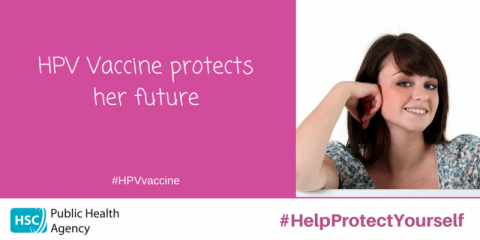PHA emphasises need for girls to get the HPV vaccine

The Public Health Agency (PHA) has urged parents of girls who are eligible to receive the human papillomavirus (HPV) vaccine to make sure that they get it to reduce the risk of developing cervical cancer later in life. The call comes as figures show a reduction in the levels of uptake of the vaccine here.
The HPV vaccine helps protect girls from developing cervical cancer when they are adults. It is offered to girls in year 9 and 10 through a school-based programme and provides the best protection against the disease.
After the HPV vaccine was launched the uptake was very good, with figures for year nine girls peaking at 88.1% in 2012. However, since then we have seen a steady decrease with 2017 being the lowest to date at 74.6%, although uptake improved with the chance to be vaccinated in year 10 for those who had missed out in year 9.
Women in Northern Ireland have a 1 in 10 chance of being diagnosed with changes to the cervix which can lead to cervical cancer at some point in their life, but the HPV vaccine can help protect against it, reducing the risk of getting cervical cancer by over 70%.
The vaccine is offered to girls in year 9, with a chance to catch up on any missed doses in year 10. The School health teams will be offering the opportunity for girls in year 9 and 10 to be vaccinated after Easter. Although uptake of the vaccine has fallen recently, it is relatively high in Northern Ireland compared with other jurisdictions. However, there are still girls who are not benefitting from this free, simple opportunity to do something which could save their life.
Dr Lucy Jessop, Consultant in Health Protection at the PHA, said: “Cervical cancer can kill so we are fortunate to be able to offer teenage girls the HPV vaccine to help protect against it. I would urge all parents or guardians to talk to their daughters about the importance of getting the vaccine and ensure that all eligible girls complete the course of vaccines when offered in school in the summer term.
“Even though the vaccine has only been available in the UK for nine years, it is very exciting that decreases in pre-cancerous lesions in the cervix and in genital warts have already been seen.
“It is estimated that the level of protection offered by the vaccine will last for at least 10 years and probably protection will be lifelong.”
Each year around 95 women are diagnosed with cervical cancer in Northern Ireland with an average of 22 women dying from the disease.
In addition, 1,225 cases of cervical cancer in situ are diagnosed each year. This is where some cells of the cervix have pre-cancerous changes, which could lead to cancer if not treated.
This vaccine helps protect against two virus types that cause over 70% of cervical cancer. The vaccine won’t protect against the remaining cancer-causing types, so it’s vital that women still go for routine cervical screening (smear tests) to check for cancer.
Dr Jessop added: “The HPV vaccine is the first step girls can take to help protect themselves against cervical cancer. Once they reach the age of 25 the next step is to go for three-yearly smear tests.”
If parents have any questions about the vaccine, they can find more information on the PHA website pha.site/hpvqanda or they can contact their school nurse directly.
Ends
